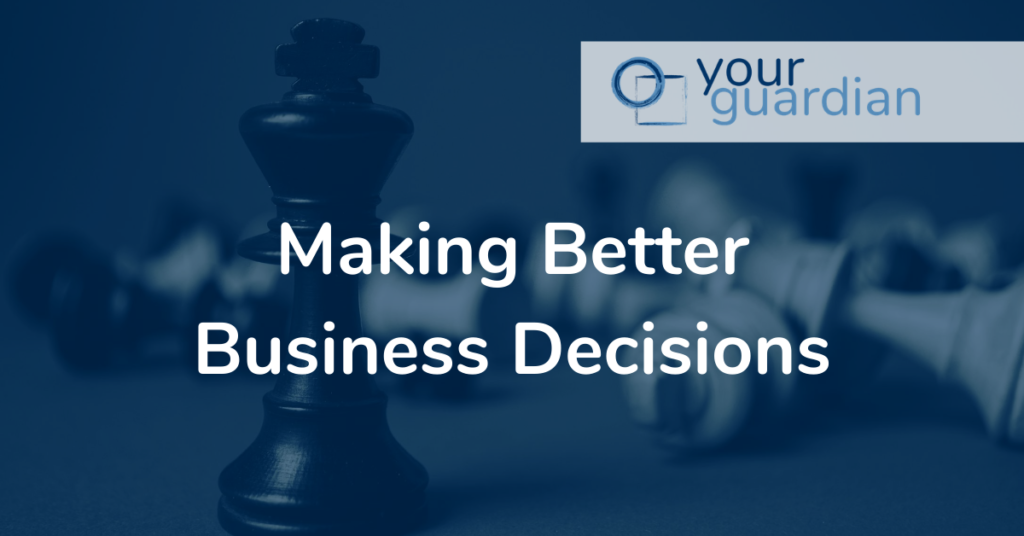Making Better Business Decisions
The ability to make good business decisions is critical to success.
Every business owner has to make tough decisions with uncertain outcomes. That is the nature of the job, and it is as true today as it was thirty years ago. But there are two big differences between decision making then and decision making today.
Decisions happen faster and on a larger scale than in the past.
First of all, information flows much faster today. Thanks to LinkedIn, Facebook, Twitter, YouTube and other social media, news that took days or weeks to disseminate around the world thirty years ago, now requires mere seconds. Moreover, once that information is released, people come to conclusions and react to it way faster than ever before. In addition, the volume of information stored and processed today vastly exceeds anything even imagined thirty years ago. However, that data often comes at a price: inaccuracies, inconsistencies, and lots of room for interpretation. Put simply, more data usually leads to more questions.
Data overload leads to bad decision making.
The overwhelming amount of data, flowing at faster rates from ever increasing sources, often leads to poor decision making or indecision. The impact of those decisions is, to a certain extent, relative to business size. Large businesses have more checks and balances, and more resources, than small businesses, however they also typically have deeper cash reserves, greater access to capital, and more inertia. The end result is that small businesses are far less resilient than larger businesses. A few moderately bad decisions can easily destroy a small business, whereas giant multi-nationals often withstand billion-pound blunders and still bounce back.
Tips to improve your decision-making skills.
Given the heightened importance of good decision making, what can small business owners do to improve the quality and consistency of their decisions? Here are a few suggestions.
Expect the unexpected.
No matter how much analysis and planning you do, you cannot predict the future, COVID-19 has shown us this. Things happen; therefore, your plans should be flexible enough so that you can adapt to the unexpected, without throwing everything off course.
Focus on what really matters.
Deciding what matters cannot be a casual decision; it has to be thought through carefully, and it should align with your company’s strategy (surely you have a strategic plan? It doesn’t have to be War & Peace, but you do need something!) The brand of your ‘must-have’ office pen is probably not critical to your company’s survival, however, responding appropriately to your largest customer’s damning review on Facebook probably is.
Keep track of what is going on in your industry.
You can’t consistently make good decisions if you don’t know the facts. Subscribe to industry news sources, build and follow a sector specific network, regularly read the business section of one or two reputable newspapers and attend major industry conferences or trade shows.
Avoid isolation.
Don’t fall into the trap of relying exclusively on a few trusted insiders to get your facts. Talk to customers, vendors, partners, suppliers, and even competitors. Force yourself outside of your comfort zone every once in a while.
Seek out help when you get out of your depth.
If you think you know everything, you are doomed to fail. If you don’t have the time or resources to delve into a particular issue, or don’t have the technical skills, or perhaps just want a second opinion, then by all means bring in outside experts to help you.
Be decisive but avoid knee jerk reactions.
This is probably the hardest of all. You don’t want to over-react and make a bad situation worse. But then again, you don’t want to hold back and over-analyse every possible contingency to the point you’re procrastinating and miss the boat.
Everybody makes mistakes, and no matter how hard you try, you will probably end up doing something over the next year that leaves you scratching your head five years from now. However, you might be able to limit the damage by following some of the suggestions provided here.
For more information about any of the content within our blog, or if you would like to have more of a talk through any part of what we do and how we might be able to help and support your business please feel free to let us know.
You can book a free session above or you can enter your details below and we will be in touch!



